Spooky Tooth were an English rock band. Principally active between 1967 and 1974 the band re-formed several times in later years.

Gary Malcolm Wright is an American singer, songwriter, musician, and composer best known for his 1976 hit songs "Dream Weaver" and "Love Is Alive", and for his role in helping establish the synthesizer as a leading instrument in rock and pop music. Wright's breakthrough album, The Dream Weaver (1975), came after he had spent seven years in London as, alternately, a member of the British heavy rock band Spooky Tooth and a solo artist on A&M Records. While in England, he played keyboards on former Beatle George Harrison's triple album All Things Must Pass (1970), so beginning a friendship that inspired the Indian religious themes and spirituality inherent in Wright's subsequent songwriting. His work since the late 1980s has embraced world music and the new age genre, although none of his post-1976 releases has matched the popularity of The Dream Weaver.
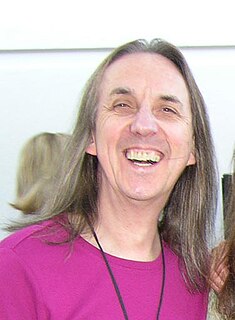
Christopher Robert "Chris" Stainton is an English session musician, keyboard player, bassist and songwriter, who first gained recognition with Joe Cocker in the late 1960s. In addition to his collaboration with Cocker, Stainton is best known for his work with Eric Clapton, The Who, Andy Fairweather Low and Bryan Ferry.

Michael Alexander Kellie was an English musician, composer and record producer.
"The Spider and the Fly" is a song by English rock band the Rolling Stones, recorded in May 1965 and first released on the US version of their 1965 album Out of Our Heads. In the UK, it was released as the B-side to "(I Can't Get No) Satisfaction".
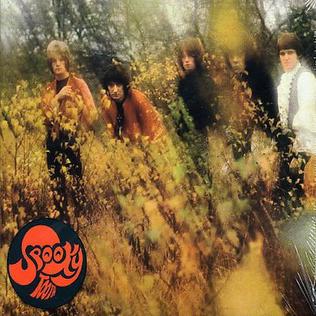
It's All About is the 1968 debut album of British band Spooky Tooth. The album was originally released in England by Island Records.

Ceremony is a 1969 album by progressive UK rock band Spooky Tooth in collaboration with French electronic and "found-object" composer Pierre Henry.
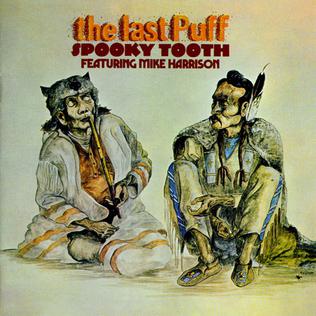
The Last Puff is an album by British rock band Spooky Tooth, released in 1970.

Songs for a Tailor is the 1969 debut solo album by the Scottish musician, composer and singer Jack Bruce, who was already famous at the time of its release for his work with the supergroup Cream. Originally released on the Polydor label in Europe and on Atco Records in the U.S., Songs for a Tailor was the second solo album that Bruce recorded, though he did not release the first, Things We Like, for another year.
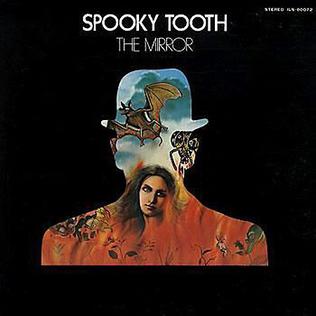
The Mirror is an album by the British rock band Spooky Tooth. It was the only Spooky Tooth album to be released without contributions from Mike Harrison. It also was their last album for nearly twenty-five years, until Cross Purpose in 1999. The Mirror was released in October 1974, one month after group members had permanently disbanded. Members went on to form such bands as Foreigner and The Only Ones.
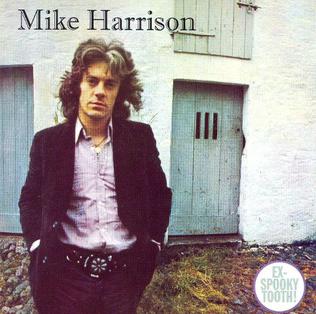
Mike Harrison is the first solo album by Spooky Tooth principal lead singer Mike Harrison, released on Island Records in 1971.

Rainbow Rider is the third solo album by Mike Harrison, most notable as a principal lead singer for Spooky Tooth. It was released in 1975, on Island Records in North America, and Goodear Records in the United Kingdom. In addition to being part of Harrison's body of solo work, the album is notable as containing one of the earlier and comparatively rare recordings of the Bob Dylan song, "I'll Keep It With Mine", written in 1964 and recorded by Nico, Fairport Convention and Marianne Faithfull, among others. The album was recorded in Nashville, subsequent to Harrison's departure from Spooky Tooth, following the release of Witness (1973). The album features a number of Nashville's best known session musicians of that time, as well as Morgan Fisher, then of Mott the Hoople, and Mick Jones, formerly of Spooky Tooth and later founder of Foreigner. The album was produced and engineered by Chris Kimsey, whose reputation as a recording engineer had developed when he was the engineer on the Rolling Stones' Sticky Fingers, released in 1971. Rainbow Rider was one of Kimsey's first engagements as a producer. Still at an early stage of his career, Kimsey had produced Monkey Grip, the first Bill Wyman solo album, released in 1974, one year prior to Rainbow Rider.

Late Starter is the fourth solo album by Mike Harrison, best known as a principal lead vocalist of Spooky Tooth. Released in 2006, it is Harrison's first solo album in over thirty years, following the release of Rainbow Rider in 1975.
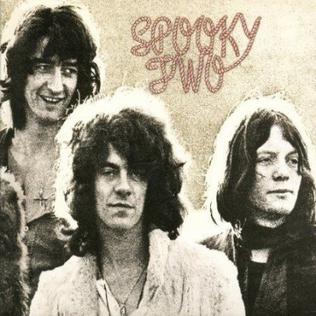
Spooky Two is the second studio album by the English rock band Spooky Tooth. It was originally released in March 1969, on the label Island Records in 1969.

Cross Purpose is the final album released by Spooky Tooth on Ruf Records in 1999. It was the first album released by the band in twenty-five years, following The Mirror, released in 1974, and the first album in thirty years to feature the majority of the original band lineup, which last recorded Spooky Two, in 1969.

You Broke My Heart So ... I Busted Your Jaw is an album by Spooky Tooth, first released in 1973 on Island Records. It was the first album to be released after the band re-formed, following their 1970 breakup. Founding guitarist Luther Grosvenor did not rejoin the band, as he had joined Mott The Hoople as a guitarist, adopting the stage name of Ariel Bender. Grosvenor was replaced by Mick Jones, who later co-founded Foreigner while founding drummer Mike Kellie was replaced by Bryson Graham. The album was remastered and re-released with a bonus track on compact disc (CD) in January 2005 by Repertoire.

How's Tricks is the fifth studio album by Scottish musician Jack Bruce, released in 1977 and credited to "The Jack Bruce Band".

Footprint is the second solo album by American musician Gary Wright, released in 1971 on A&M Records. It contains "Stand for Our Rights", an anthem-like song calling for social unity that was issued as a single in advance of the album. Wright recorded the majority of Footprint in London with a large cast of musicians – including George Harrison, Hugh McCracken, Alan White, Klaus Voormann, Jim Gordon, Jim Keltner and Bobby Keys – many of whom, like Wright, had played on Harrison's All Things Must Pass triple album in 1970. Harrison's contributions included an uncredited role as producer, and serve as an example of his support for Wright during the early stages of the latter's solo career. The ballad "Love to Survive" is one of three tracks that feature an orchestral arrangement by John Barham.
The Hamburg Blues Band is a German blues band, notable for its associations with prominent English musicians as invited guests and band members.



















